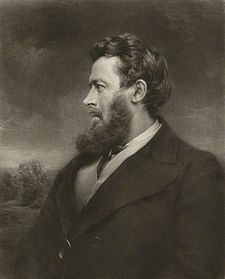Bagehot, Walter

Bio: (1826-1877) British economist, journalist, and political theorist. Walter Bagehot studied philosophy at University College. He wrote literal essays on many artists and political figures from English history. He also worked as a banker. Bagehot was editor-in-chief of The Economist for seventeen years and made it Britain's most respected economic and political magazine. He represented conservative liberalism (politically conservative and economically liberal), but he cared for the plight of the people who suffered the effects of the social problems that industrialization created. Bagehot’s book Lombard Street (1873) studies the role of the central bank of England.
In 1867, he wrote the book The British Constitution, which investigates how the English political system really works. Bahegot opposes the opinions of Charles-Louis Montesquieu and the American Federalist Papers writers who claimed that the United Kingdom’s liberty comes from the separation of powers (legal, executive, and judicial). In contrast, Bagehot stated that the English constitution possessed the “efficient secret” that the cabinet (prime minister and his ministers) works as a “buckle” that joins the “dignified” (the formal institutions of church, Parliament, and monarchy) with the “efficient” part of the constitution. The British constitution supports the doctrine of parliament supremacy as it subordinates the House of Commons, all laws, and the judiciary. In that sense, legal, executive, and judicial powers are fused and represented by the cabinet.
Bagehot's social Darwinism is presented in the book Physics and Politics published in 1872, in which he applies the latest knowledge from anthropology and evolution to the study of the development of societies and nations. This book represents one of the first applications of Darwinism to politics. Bagehot studied social evolution and defined progress as: "an increase of adaptation of man to his environment, that is, of his internal powers and wishes to his external lot and life" (1872: 209). In his view progress is rare and happened only in a very small number of societies which represented exceptions, while stagnation is the norm for most societies. Human history is analogous to natural history in that both are based on heredity and progress. Variations in both culture and biology, between different populations weren't the product of chance and randomness but were achieved through will and effort.
in prehistoric times savages lacked the moral and intellectual capacity or discipline, which is true for modern savages as well. In the next stadium, people united and adopted the laws that demanded obedience to an elite, blind adoption of collective norms, and total submission to religion. Those united groups waged wars against each other and the strongest defeated all others. Bagehot call this stage the "preliminary" stage of civilization, or the "fighting age". People in those societies were directed by imitation, customs, and religion, which all reinforced conformity and precluded novel variations from emerging which brought a period of long stagnation. The third stage arrived with the emergence of the society in which politics was based on rational discussion and "popular government". The discussion helped to demystify political and religious power, and insured the growth of intelligence and tolerance,
Fields of research
Aristocracy Authority Capitalism Conservative Ideology Democracy Economy Evolution Freedom Ideology Individualism Inequality, Social Institution and Organization Law Liberalism Market Monarchy Politics Power, Political State Imitation Morality ReligionTheoretical approaches
Social DarwinismMain works
The English Constitution (1867);
Physics and Politics, or, Thoughts on the Application of the Principles of "Natural Selection" and "Inheritance" to Political Society (1872);
Lombard Street: a Description of a Money Market (1973).

